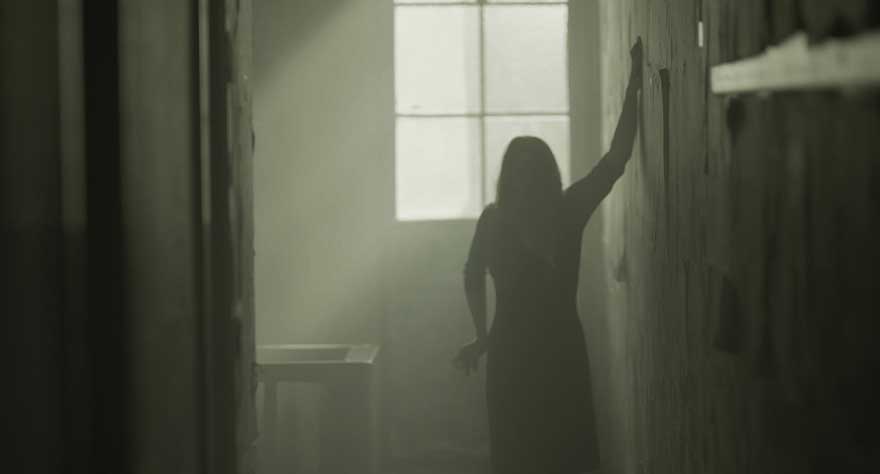
As a mood piece, 'Observance' is an effective little horror film.

As a mood piece, 'Observance' is an effective little horror film.
Taking its cues from the likes of Roman Polanski’s Rosemary’s Baby and Francis Ford Coppola’s The Conversation, Observance is yet another horror film to come out of Australia, where the genre seems to be having a resurgence as of late. But instead of going down the same classical and metaphorical route as recent Aussie horror triumph The Babadook, Observance prefers to keep its characters and viewers in the dark. There are some bad things rumbling around in the darkness throughout this film, although director/co-writer Joseph Sims-Dennett doesn’t really have much interest in enlightening anyone on what exactly those things are. That’s part of the danger of taking a low-key approach; play it right and people can stay terrified by what isn’t happening, but play it wrong and, well, nothing happens. Observance doesn’t land firmly on either side of those two possibilities. It lands somewhere around the middle, making it a frustrating experience as it delivers some unnerving jolts within a dull narrative.
Parker (Lindsay Farris) needs a lot of money. After a tragic incident leaves him with a broken marriage and a mountain of debt, Parker goes back into his old line of work as a private investigator. His first assignment has him observing a young woman named Tenneal (Stephanie King) in her apartment over several days, a job that sounds easy but gets progressively strange. Parker gets offered a significant amount of money to stay in an abandoned apartment across the street from Tenneal’s place, provided that he never leaves the building and contacts no one except for his superiors to report what’s happening. The apartment turns out to be a nasty, derelict place, with newspaper lining the walls and God knows what decomposing in every dark corner. Parker, thinking about the money, decides to deal with it and get the job done.
But hey, this is a horror movie, so where’s the fun in watching someone just stare at someone all day and night? It’s soon apparent that Parker should really pay more attention to the building he’s in than Tenneal across the street, because some seriously weird stuff starts happening around him. Sims-Dennett doesn’t really care to let anyone know what’s happening, but he really loves pointing out that whatever’s going on isn’t good, whether it’s slowly zooming in on a bloodstain on the apartment floor (courtesy of Tucker cutting his finger on a rusty nail) or showing Tucker’s increasingly deranged nightmares. There’s a small aura of mystery around whatever Tucker has inadvertently made himself a part of, but some hints dropped early on make it easy to get a sense of where things will end up (perhaps the biggest influence here is Ben Wheatley’s Kill List, a comparison that attentive viewers might quickly pick up on). That makes Observance turn into a waiting game.
One of the nice parts of that wait is how, on a technical level, Observance shines. Rodrigo Vidal-Dawson’s cinematography makes Parker’s temporary living space look perfectly unsettling, letting the empty space of the apartment dominate the frame. The sound design also does a good job sustaining the film’s uncomfortable tone, relying on loud bursts of noise and high frequency in a way that’s surprisingly not obnoxious. The cinematography and sound go a long way in making the film’s few outright horrific sequences land effectively, with one moment in particular providing a really nice fright.
The narrative, on the other hand, drops the ball. Sims-Dennett and co-writer Josh Zammit lean heavily on clichés, like the person who tries to warn the protagonist with vague, useless advice (“You don’t understand, it’s an offering!” someone says to Parker when he sees a dead rat, a line that doesn’t really help clear things up). And at a certain point, it’s hard to believe Parker would even bother staying in that place, especially when he starts vomiting black tar (for some reason, this doesn’t really faze Parker that much). Even worse is when the film switches perspectives from Parker to a different character at a pivotal moment, a choice that makes for a rather anticlimactic ending. Observance may fumble quite a bit when judging it in terms of its writing, but as a mood piece, it’s a far more effective film. Putting its clichés and reliance on withholding information for the sake of mystery aside, there are some undeniably creepy moments peppered throughout. That’s certainly worth something, especially within a genre where it’s rare to see that kind of strong handle on tone.
Observance had its world premiere at Montreal’s Fantasia Film Festival on July 19th. To find out more about the festival, visit www.fantasiafestival.com